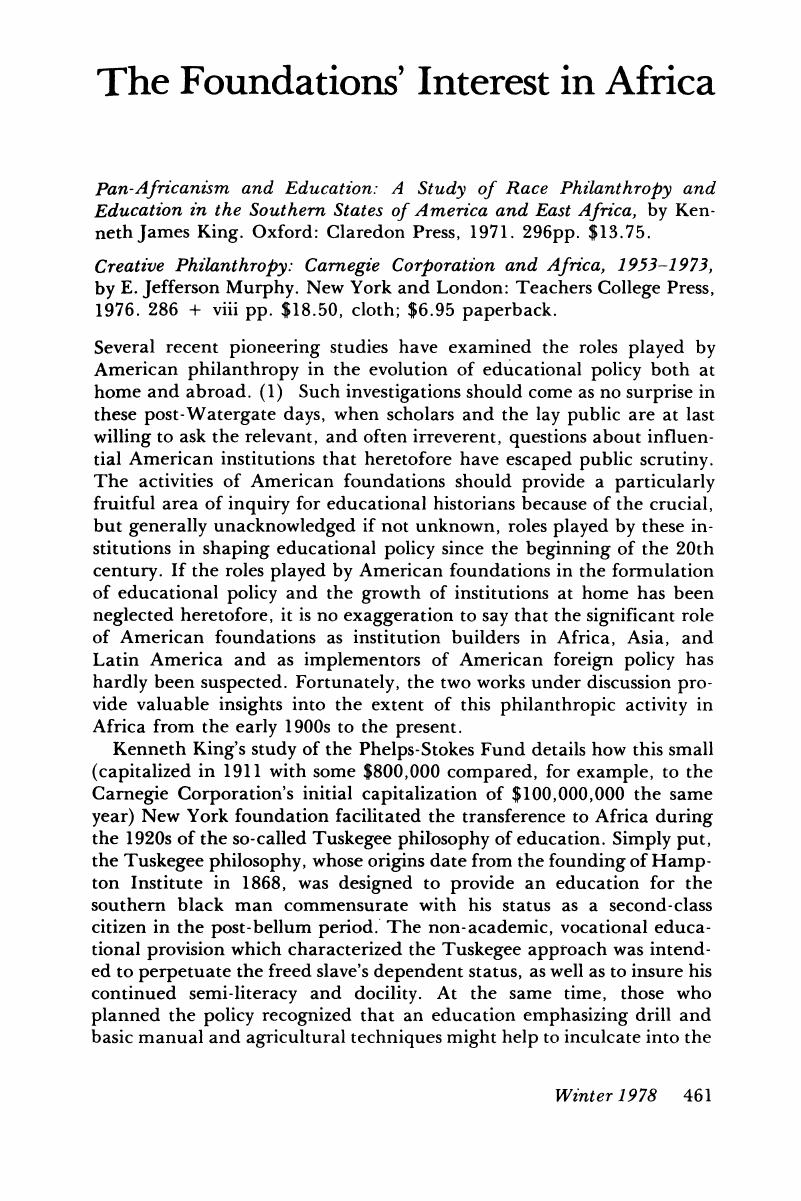Article contents
The Foundations' Interest in Africa
Published online by Cambridge University Press: 24 February 2017
Abstract

- Type
- Essay Reviews
- Information
- Copyright
- Copyright © 1978 by New York University
References
Notes
1 A partial list includes: Anderson, James D., “Education as a Vehicle for the Manipulation of Black Workers,” in Feinberg, Walter and Rosemont, Henry (eds.), Work, Technology and Education: Dissenting Essays in the Intellectual Foundations of American Education (Urbana, 1975); Arnove, Robert F., “The Ford Foundation and ‘Competency-Building’ Overseas: Assumptions, Approaches, and Outcomes,” Studies in Comparative International Development (Fall 1977); Ashley, Walter E., “Philanthropy and Government: A Study of the Ford Foundation's Overseas Activities” (unpublished Ph.D. dissertation, New York University, 1970); Berman, Edward H., “American Philanthropy and African Education: Toward an Analysis,” African Studies Review, vol. XX, no. 1 (Spring 1977); Buss, Dennis C., “The Ford Foundation and the Exercise of Power in American Public Education” (unpublished Ed.D. dissertation, Rutgers University, 1972); Horowitz, David, “Sinews of Empire,” Ramparts (October 1968); Horowitz, David and Kolodney, David, “The Foundations: Charity Begins at Home,” Ramparts (April 1968); Karier, Clarence J., “Testing for Order and Control in the Corporate Liberal State,” in Clarence J. Karier, Violas, Paul, and Spring, Joel (eds.), Roots of Crisis: American Education in the Twentieth Century (Chicago, 1973); Weischadle, David, “Carnegie: A Case Study in How Foundations Make Decisions,” Phi Delta Kappan (October 1977); and his “The Carnegie Corporation of New York: A Study in Educational Politics” (unpublished Ed.D. dissertation, Rutgers University, 1970). A forthcoming volume to be edited by Arnove, Robert F. and entitled American Philanthropy and Cultural Imperialism (Boston, 1979) will bring together many of the themes discussed by the authors cited above.Google Scholar
2 For details: Bullock, Henry A., A History of Negro Education in the United States from 1619 to the Present (Cambridge, Mass., 1967); and Harlan, Louis R., Separate and Unequal: Public School Campaigns and Racism in the Southern Seaboard States, 1900–1915 (New York, 1968).Google Scholar
3 Proceedings of the Second Capon Springs Conference for Education in the South, 1899 (Capon Springs, n.p., 1900), p. 38.Google Scholar
4 Quoted in Anderson, James D., “Education as a Vehicle for the Manipulation of Black Workers,” pp. 33–34.Google Scholar
5 Ibid., p. 34.Google Scholar
6 The term is borrowed from Thompson, Leonard M., who used it to describe the racially determined social order in South Africa. See his “The South African Dilemma,” in Hartz, Louis (ed.), The Founding of New Societies: Studies in the History of the United States, Latin America, South Africa, Canada, and Australia (New York, 1964).Google Scholar
7 For details: Berman, Edward H., “Tuskegee in Africa,” The Journal of Negro Education, vol. XLI, no. 2 (Spring 1972).Google Scholar
- 1
- Cited by


